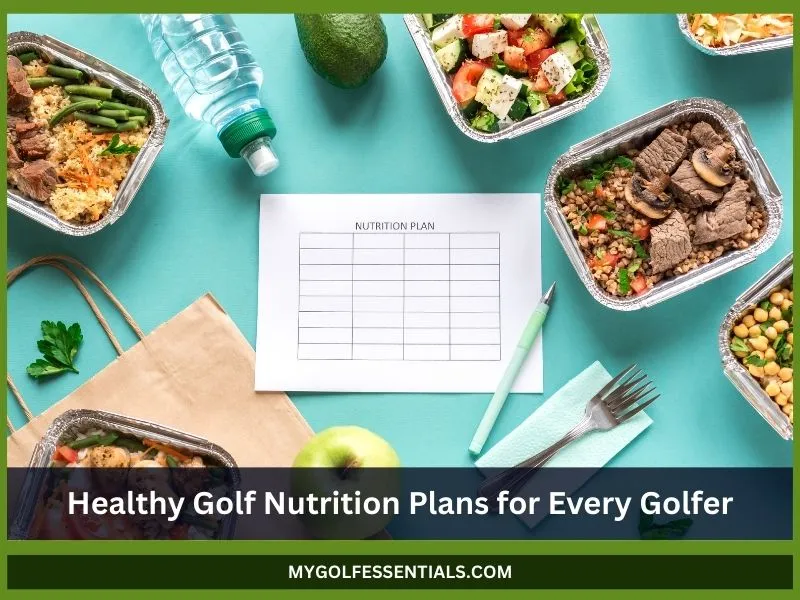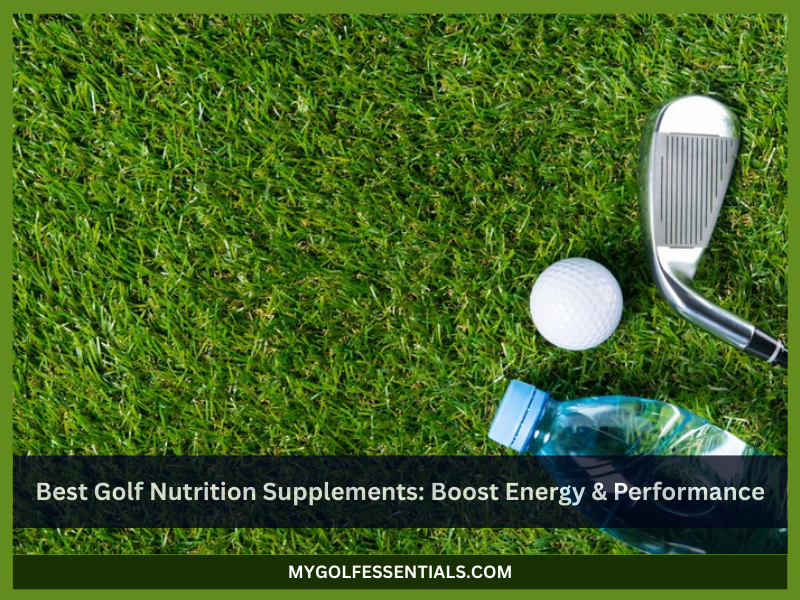
Ever wonder why some golfers seem to stay sharp and energized all 18 holes while others fade fast? A big part of the answer is golf nutrition, what you eat before, during, and after your round makes a bigger difference than you might think.
In this article, we’ll break down simple and effective nutrition plans that work for any golfer, no matter your skill level. From pre-game meals to on-course snacks and supplements, you’ll learn exactly what to eat to keep your energy up and your swing strong.
Why Nutrition Matters in Golf
Ever feel like you’re playing great in the beginning but start losing steam by the back nine? The truth is, golf nutrition plays a huge role in your performance. It’s not just about eating healthy, it’s about fueling your body with the right foods that keep your energy up, your focus sharp, and your endurance going strong throughout the round.
The Role of Food in Performance
Golf may not have the same fast pace as other sports, but that doesn’t mean it’s easy. You’re out there for hours, walking, swinging, and concentrating on every shot. If you’re not fueling your body correctly, it’s easy to hit a wall.
Good golf nutrition helps in these key ways:
- Keeps your energy steady: No more feeling like you’re running on empty halfway through.
- Improves focus: Helps you make better decisions and stay in the zone, especially when you’re standing over a tough putt.
- Supports recovery: After walking the course for hours, your body will thank you when you’ve got the right nutrients to keep you going.
If you’ve ever felt great at the start and sluggish toward the end, it’s likely a nutrition issue. Experts agree that eating the right high energy foods, like complex carbs and lean protein, can help you maintain energy and avoid a mid-round crash.
Preventing Fatigue and Boosting Consistency
There’s nothing worse than hitting a slump after a few holes, fatigue can lead to missed shots and mistakes. But when you eat the right foods, you’re not just helping your body, you’re giving your brain the fuel it needs to stay sharp too.
Good golf nutrition can help you avoid things like:
- Feeling sluggish in the afternoon
- Losing focus or getting the shakes because of low blood sugar
- Cramping up when you need your body to stay loose
Now that we know why it’s important, you’re probably wondering: What should you eat before you play to set yourself up for success? Let’s discuss this in the next section.
What to Eat Before You Play
We’ve all been there: you either skip breakfast and regret it halfway through the first nine, or you go too heavy and end up feeling sluggish. Finding the right balance is key, and that’s where golf nutrition really starts to work for you.
Ideal Meal Timing
Timing is everything. Try to eat your meal 2 to 3 hours before tee time. This gives your body time to digest and get that energy flowing so you’re not feeling sluggish or hungry halfway through.
If you’re running short on time, a light breakfast or smoothie an hour before you start can also do the trick.
Best Foods to Eat Before Golfing
The goal here is to keep your energy up without weighing you down. You want foods that are easy to digest but also pack a punch in terms of nutrients.
Here are a few great options:
- Scrambled eggs + whole grain toast + half an avocado – A perfect combo of protein, healthy fats, and carbs.
- Greek yogurt + granola + berries – Light and packed with protein, plus the carbs you need.
- Oatmeal with banana slices and almond butter – A solid option for slow-release energy.
- Smoothie with spinach, banana, oats, and protein powder – Quick and easy, and it gets all those good nutrients in.
These meals combine complex carbs (which give you steady energy) with lean protein (to help your muscles). This is the kind of fuel you need to play your best.
Tip: Hydrate Early
Don’t wait until you’re thirsty to start drinking. Hydration is a key part of golf nutrition that many people overlook. Drink some water or an electrolyte drink with your pre-round meal, and you’ll avoid dehydration headaches or fatigue during the round.
What you eat before you play sets you up for success, but it’s not just about the pre-round meal. You’ll also need to keep your energy up during the round. Let’s move on to what to eat while you’re on the course.
Smart Snacks for the Course
We’ve all been there: you’re cruising through the front nine, but by the time you hit hole 6 or 7, you start feeling those hunger pangs. The key to staying sharp and energized is having the right snacks on hand ensuring proper golf nutrition.
Best Foods to Eat While Golfing
So, what’s the best snack to keep you going without making you feel sluggish? Here are some great options to keep in your bag:
- Bananas: Easy to eat, packed with potassium, and great for muscle function.
- Trail mix: A mix of nuts, seeds, and dried fruit for a balance of protein, fats, and carbs.
- Granola bars: Choose ones with whole grains and nuts for sustained energy.
- Nut butter (on whole grain crackers or an apple): Quick, satisfying, and full of healthy fats and protein.
These snacks are perfect for giving you a quick energy boost without weighing you down. Plus, they’re easy to munch on as you walk between holes.
When to Snack
Timing your snacks is just as important as choosing the right foods. The best times to snack are around holes 6–7, when you start to feel that first wave of hunger, and then again at the turn. This helps you avoid getting too hungry or sluggish as the round goes on.
By fueling up at the right times, you’ll maintain a steady energy level and proper golf nutrition, keeping you sharp and focused without that “sluggish” feeling that comes from heavy or processed foods.
High-Energy Foods to Keep You Going
Now that we’ve covered snacks, let’s talk about some high-energy foods that will keep you fueled all the way through your round. These foods provide sustained energy, meaning you won’t experience the ups and downs of quick sugars.
Best High-Energy Foods
For lasting energy, aim for foods that are low-glycemic (they don’t cause blood sugar spikes and crashes). Some of the best options are:
- Sweet potatoes: Packed with complex carbs and fiber for long-lasting fuel.
- Oats: Great for steady energy release and full of nutrients.
- Apples: They provide natural sugars and fiber, perfect for a quick, but steady, pick-me-up.
- Dried fruits: Like raisins or apricots, these are easy to pack and offer a good source of natural sugars and fiber.
These foods don’t just give you energy, they also keep your body feeling good. They’re loaded with nutrients that support muscle recovery and overall well-being during your round.
Why Low-Glycemic Carbs Are Key
Low-glycemic carbs like sweet potatoes and oats are perfect because they digest slowly, keeping your energy levels steady throughout your round. This means you’re less likely to crash or feel sluggish during the back nine.
Avoiding Sugary Snacks
It might be tempting to grab a candy bar or a sugary snack when you’re feeling a dip in energy, but those quick fixes can cause a sugar crash later. Stick to whole foods and natural sugars for steady energy. Avoid processed snacks that can leave you feeling tired and unfocused.
By choosing the right high-energy foods, you can keep your performance strong and consistent all the way through the round. And the best part? You won’t feel the need to take a nap after 18 holes.
Golf Nutrition Supplements: Do You Need Them?
Sometimes, even with the best meal plans, we’re still looking for that extra edge. That’s where golf nutrition supplements can come in handy, but the key is knowing when to use them and when whole foods will do just fine.
Common Supplements for Golfers
- Protein Powders: If you struggle to get enough protein in your diet or want a quick post-round recovery, protein powders can be a good option. Look for one that’s low in sugars and additives.
- Electrolyte Drinks: Staying hydrated on the course is essential, and electrolytes help replenish what you lose through sweat. A good electrolyte drink can keep you feeling energized, especially in hot conditions.
- Omega-3s : These are known for supporting joint health and reducing inflammation, both of which can help golfers who are on the course a lot.
When Supplements Are Helpful vs. Whole Foods
Supplements are useful, but they’re not a replacement for real food. Ideally, whole foods should be your go-to because they offer a full range of nutrients that work together to keep your body in balance.
However, there are situations where supplements can help:
- Protein powders can be a quick and convenient option if you don’t have time for a full meal after a round.
- Electrolyte drinks are great for rehydration when you’re sweating a lot, or if you’re playing on a hot day.
But remember, supplements should complement your diet, not replace it. If you can get the same nutrients from whole foods, that’s always the better option.
Tips for Choosing Quality Supplements
If you decide to go the supplement route, here’s how to pick the best ones:
- Check the ingredients: Look for minimal additives or artificial ingredients.
- Read the label: Ensure the product has a high-quality source of protein, vitamins, or minerals.
- Go for trusted brands: Stick to well-known, reputable brands that have transparency about their sourcing and manufacturing.
Supplements can certainly play a role in your golf nutrition plan, but they should never replace a well-balanced diet. Now, let’s look at something just as important: recovery after the round.
What to Eat After Your Round
After spending hours on the course, your body is ready to refuel and recover. Post-round nutrition is just as crucial as pre-round nutrition because it helps your muscles repair, restores your energy, and sets you up for your next round.
Post-Round Recovery Meals
After you finish playing, aim for a meal that combines lean protein with complex carbs. This will help rebuild muscles and replenish glycogen stores.
Some great recovery meal options include:
- Chicken with brown rice and vegetables: A great mix of lean protein and slow-digesting carbs.
- Smoothie with protein powder, fruit, and oats: Quick to make and packed with nutrients.
- Turkey sandwich on whole grain bread with avocado: Protein and healthy fats for muscle repair.
These meals give you the building blocks your body needs to recover effectively.
Rehydration is Key
Don’t forget about rehydration. After hours on the course, you’re likely to be dehydrated, especially if you’ve been sweating in the heat. Water is essential, but adding an electrolyte drink can help you replace lost sodium, potassium, and magnesium, critical minerals for your muscle function and energy levels.
Supporting Your Next Game with Recovery Nutrition
The goal of recovery nutrition is to get you ready for your next round. A good recovery meal helps prevent fatigue, reduces soreness, and prepares your body for the physical activity it will face next time you hit the course.
By giving your body what it needs post-round, you’ll feel ready and refreshed for the next day of play, rather than dragging yourself through it. And we all know a well-rested and well-nourished body plays better!
Simple Golf Nutrition Plan for Any Golfer
When it comes to golf nutrition, it’s important to have a simple and consistent eating plan that supports your performance on the course. While every golfer’s needs are a little different, a well-balanced approach to meals, snacks, and hydration can make all the difference in how you feel and play.
Sample Daily Eating Plan
Let’s break down a basic daily nutrition plan that any golfer can follow. The goal is to fuel your body for the day ahead, keep your energy steady throughout your round, and help with recovery after.
Breakfast (2–3 hours before tee time):
- Whole grain toast with avocado and scrambled eggs: Provides complex carbs and protein to fuel your body.
- A banana or some berries: Offers natural sugars for a quick energy boost.
Mid-Morning Snack (if needed, especially if you have an afternoon tee time):
- A small handful of mixed nuts: A great combo of healthy fats and protein to keep you energized.
- An apple: Gives you fiber and natural sugar to keep your energy levels up.
Lunch (2 hours before you play):
- Grilled chicken or turkey wrap with veggies and a whole grain tortilla: A good balance of lean protein and complex carbs.
- A small serving of quinoa or brown rice: For sustained energy.
During Your Round (Snacks at Holes 6-7 and Turn):
- Trail mix or granola bars: These snacks are perfect for maintaining energy without feeling sluggish.
- Hydrate with water or an electrolyte drink: Keeps you from getting dehydrated, especially on hot days.
Post-Round Recovery (within 30–60 minutes of finishing):
- Protein smoothie with fruit and a scoop of protein powder: Helps muscle recovery and replenishes lost nutrients.
- Or a lean protein with complex carbs: Like grilled salmon with sweet potato or a chicken and rice bowl.
Adjustments for Morning vs. Afternoon Tee Times
The timing of your tee time can affect what and when you should eat. Here’s a quick guide to make sure you’re fueling properly:
- Morning Tee Times (before 10 AM): Since your body has been fasting overnight, it’s important to have a hearty breakfast at least 2–3 hours before your tee time. This ensures you have the energy to get through your round. If you’re running short on time, a smoothie with protein, fruit, and oats can be a great quick option.
- Afternoon Tee Times: With afternoon rounds, you have a little more time to prepare. Start with a solid breakfast and have a light lunch around 12–1 PM to keep your energy up before heading to the course. A smaller snack around holes 6–7 will help you avoid any mid-round energy dips.
Tips for Staying Consistent with Your Golf Nutrition Routine
Consistency is key, so here are a few simple tips to make sure you’re sticking to your nutrition plan:
- Plan ahead: Pack your meals and snacks the night before to ensure you’re ready for the day. If you’re traveling, consider preparing snacks in advance.
- Stay hydrated: Make it a habit to drink water or an electrolyte drink throughout the day, not just during your round.
- Balance is key: Include a mix of complex carbs, lean proteins, and healthy fats in each meal to keep your energy levels consistent.
- Listen to your body: If you’re hungry, eat something! Adjust the portions to fit your individual needs.
By following this simple golf nutrition plan, you’ll be setting yourself up for success on the course. It’s all about maintaining that energy, focus, and endurance to keep your game sharp.
Conclusion
Incorporating a well-rounded golf nutrition plan into your routine is key to maintaining energy, focus, and endurance on the course. From what to eat before you tee off to the snacks you enjoy mid-round, and even your recovery meals, every choice plays a role in helping you perform at your best.
Remember, staying consistent with your nutrition, whether you’re fueling with complex carbs and lean proteins or hydrating properly, can make all the difference in your game.
With the right approach, you’ll not only feel better during your round but also improve your overall consistency and stamina on the course. So, take these tips, customize them to fit your schedule, and watch your game and your energy levels, soar!
Key Points
- Golf Nutrition is crucial for maintaining energy, focus, and endurance during a round, helping to prevent fatigue and improve consistency.
- Eating complex carbs (like whole grains) and lean proteins (like eggs or chicken) before playing helps fuel the body and provide lasting energy.
- Hydration is essential on the course, water and electrolyte drinks help replace lost fluids and prevent dehydration.
- Smart snacks for golfers include bananas, trail mix, granola bars, and nut butter, and should be consumed around holes 6-7 or at the turn to maintain energy.
- Avoid sugary or processed snacks while golfing, as they can cause energy crashes, focus on low-glycemic carbs like oats and sweet potatoes instead.
- Golf nutrition supplements like protein powders and electrolyte drinks can be helpful but should complement whole foods, not replace them.
- Post-round recovery meals should include a mix of lean protein and complex carbs to repair muscles and replenish energy stores.
- Adjust your nutrition based on your tee time, eat a hearty breakfast 2-3 hours before morning rounds and lighter meals before afternoon rounds.
- Consistency is key, plan your meals, snacks, and hydration ahead of time to ensure you stay on track with your golf nutrition throughout the day.
A well-balanced golf nutrition plan can help you perform at your best, enhancing both your physical endurance and your mental focus during your rounds.
FAQs
How can I stay consistent with my nutrition routine?
Plan meals and snacks ahead of time, pack them the night before, and stay mindful of hydration. Consistency helps maintain energy levels and supports performance.
How does proper nutrition impact my golf game?
Good nutrition supports physical endurance, mental focus, and overall health, leading to improved performance on the course. It helps maintain energy levels and reduces fatigue, contributing to better consistency and stamina.
How does my tee time affect my nutrition plan?
For morning tee times, have a hearty breakfast 2–3 hours before playing. For afternoon rounds, eat a solid breakfast and a light lunch around 12–1 PM, adjusting snacks accordingly.



